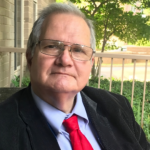
It’s worth remembering the doctrine of original sin during Advent because without it, Christmas—as least as we know it—doesn’t make sense.
By “original sin” we mean that sin which, at the beginning of the human race, estranged man from his Creator and warped the human nature of all subsequent human beings. As the Catechism puts it,
Man, tempted by the devil, let his trust in his Creator die in his heart and, abusing his freedom, disobeyed God’s command. This is what man’s first sin consisted of. All subsequent sin would be disobedience toward God and lack of trust in his goodness (397).
Every Sunday, we say we believe he came “for us and for our salvation.” “He was born of the Virgin Mary, and became man.” And for the last few weeks, we have been preparing to celebrate the birth of Christ. But why was Jesus born? Why did he come into the world?
If it was for our salvation, we needed to be saved. From what? From sin.
Each one of us is a sinner. Each of us has his own personal guilt for which he is personally responsible. Each of us has personal sins. But each of us is also implicated in original sin.
How so? By the very fact that we have a proclivity to sin. Nobody has to teach us how to sin. Nobody sits down with his little kid and says, “Now, Johnny, let’s learn how to lie through our teeth. Remember: when you fib, look like you believe it!”
No, we all seem to have mastered that lesson. And that, in a sense, is original sin: our inclination to do evil. We start small. (Even marathon runners first started by falling on their rears as toddlers. You gotta start somewhere.)
The important points are two:
First, God did not create man with an in-built proclivity to do evil, so the fact that human nature is warped, inclined to do wrong, is not what God intended.
Second, without God’s special grace, man is incapable of avoiding all sin, including venial sins.
Original sin is the wound we all share because we all share human nature. That nature is damaged: our intellects are darkened (we let ourselves believe good is evil and evil good); our wills are weakened (doing good is often hard, doing bad really easy); and we seem to have some facility at it, from baby steps (stealing a pencil) to full-grown ones (stealing people’s investments).
You don’t need to be a genius to see that human beings are quite good at being bad. And when you stop and think about it, if you believe in a good God, then you have to conclude that he didn’t want it that way, and that there’s something about Adam (and Eve and their descendants) that’s not quite right.
The problem is that, when you hurt yourself, you can’t always fix things. In Adam, man is fallen, and he can’t get up. A suicide can kill himself, but he can’t change his mind about it post-factum. The same is true for our nature.
The human Humpty Dumpty fell, and neither he nor “all the king’s men” can put him back together. Man broke the masterpiece God made. Man should fix it, but he can’t (suicides can’t restore their lives). God can, but he’s the one injured, not the one injuring—and it’s the injured one who deserves restitution.
The only way to fix the human Humpty Dumpty is a man who is also God. Or God in human flesh: Jesus Christ. That’s why we celebrate Christmas.
Yes, there have been theologians who speculate that even if man had not sinned, Jesus might have become incarnate. Perhaps. But we don’t know that for sure, and in any case, the point’s academic. Man did sin, and he needed a savior who was God and man. He needed Jesus.
Now, some people wonder whether original sin is just some theological fable, dreamed up in an earlier time that we have outgrown. Well, no, and for these reasons:
1. Humanity is one. People may be divided by sex, race, language, when they lived and died, and a thousand other things. But the one thing we all have in common is our human nature. Without that common link, there is no human race. If there is no human race, there is no basis to talk about human equality: we are all then discrete individuals, with greater or lesser strengths and weaknesses, and the idea of any human fraternity is lost.
By the way, please note: the idea of human equality did not come from liberal democracy or the Enlightenment. It came from the Christian doctrine of man’s common creation.
2. Humanity is flawed. Our nature is warped and thus inclined toward sin. It’s not depraved, but it’s warped. Socrates—no Christian—said, “Know thyself!” If you want to know what one can (and can’t) expect from man, then know he has a flawed nature.
3. Because that nature is flawed, no human project of “self-improvement” or “progress” is going to succeed on its own. “Progress” is not inevitable. The future is not necessarily going to be better. Evil is not a lack of knowledge or a stupid choice; it can be deliberate and malicious. Short of God’s grace, no human project is going to fix man, because man can’t fix himself.
4. This is why we’re preparing for Christmas. Because, aware that man can’t fix himself and yet still in love with his image and likeness, Jesus—the Second Adam—came to repair what the First Adam broke. That’s why Advent has a penitential aspect: we wait because we can do nothing else. At the same time, “we want in joyful hope for the coming of our Savior, Jesus Christ,” because we know the ending of the story: that he came to bring us life to its fullness.
Baptism gives us the right to the graces we need to overcome original sin—i.e., to love and obey God as he intended. But that’s another part of the story. For now, bask in that joyful hope, and merry Christmas!



